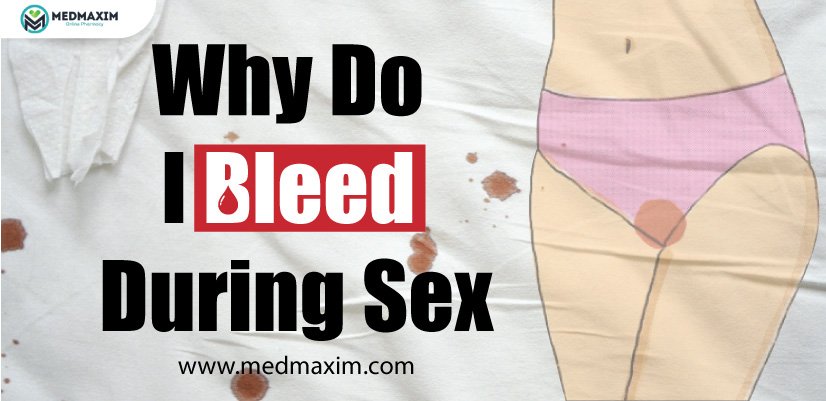Sometimes, after having sex you might notice blood coming out of your vagina. You may wonder if your menstrual period is not due any time soon then why is this bleeding happening? It might even scare you a bit. However scary it might seem, it is quite common. Almost 9% of menstruating women experience bleeding during and after sex. But there is the possibility of an infection or in rare cases, it could be a sign of cervical cancer.
Having Sex For The First Time
Bleeding during or after sexual activity is normal, especially if it is your first time having sex. Bleeding during the first sexual encounter is considered entirely normal and it is nothing to worry about. Penetrative sex can cause the splitting of a thin membrane or a piece of tissue known as the hymen. The hymen partially covers your vaginal opening and once it gets broken, bleeding occurs during intercourse. However, there are several other ways by which your hymen can be broken. So, even if some women do not bleed during their first normal sex.
Is It Okay To Bleed Occasionally?
For menstruating women light bleeding on rare occasions followed after penetrative sex is probably nothing to worry about. A little bit of blood spotting during or after sex rarely, which goes away soon can be just a normal bodily thing. Note that, if you are having sex close to your period, around two to three days before, chances are, you might expect a little blood during sex. However, if you experience bleeding every time, you need to see a doctor.
For those who have hit menopause or postmenopausal, any bleeding after penetrative sex is not considered normal. See your doctor that can help you to identify your problem and rule out cervical cancer, endometrial cancer, or other issues.
Reasons For Bleeding During Sex
Bleeding Due To Cervical Ectropion
The cervix is the lower end of the uterus. It is located on the top of the birth canal (vagina) and changes here can lead to bleeding during sex.
Cervical ectropion is a non-cancerous condition that happens when soft cells that normally line the walls of the cervix, protrude from the inside through the cervical canal. The condition is not problematic, but just because the cells are too soft, they can cause pain and bleeding during or after intercourse.
Moreover, this condition arises due to hormonal changes, or during pregnancy. Sometimes, it is also caused due to the intake of contraceptive pills. You should speak to your doctor as they can suggest some procedures for this condition.
Sexually Transmitted Diseases (STDs)
Symptoms associated with each type of sexually transmitted infection are different and the inflammation caused due to these infections results in bleeding during or after sex. STIs like chlamydia and gonorrhea cause vaginal symptoms including pelvic pain, vaginal discharge, and frequent, painful urination.
Moreover, a type of STI known as Trichomoniasis is a disease that is commonly characterized by cervical bleeding and discharge. Other infections such as Herpes and Syphilis cause sores in the genitals that are highly sensitive, if irritated due to penetrative sex, cause bleeding further. In some cases, the sores can be painless and unnoticed until they bleed.
Vaginal Dryness
Dryness or lack of lubrication is most common in women especially after hitting menopause. However, you may still experience vaginal dryness at any age due to several psychological factors such as stress, anxiety, depression, etc.
One of the prevalent causes of it is lack of sexual stimulation or foreplay. It is an indication that you may need to spend some extra time and effort to get yourself into a sexually aroused state to trigger sufficient lubrication. Otherwise, you might experience intense pain and discomfort during penetration that may irritate your vagina and cervix resulting in bleeding. Hence, lubrication makes it easier for the penile to enter inside the vagina and it aids in frictionless penetration.
In addition, a drop or fluctuations in estrogen levels after menopause or childbirth, or during breastfeeding also can be a cause of dryness.
Vaginal Injuries Or Frenulum Tear
Injuries or tears caused in the vagina due to rough thrusting or friction during sex, or damage during childbirth can also cause bleeding.
In men, bleeding occurs due to frenulum tear during penetration. Frenulum is the area of sensitive skin on the underside of the penis, right near the center of the head.
Cancer
Sometimes bleeding can result due to cancer of cervix, vagina, or uterus. In this case, one may experience unexpected vaginal bleeding including bleeding after sex. Other symptoms of cancer can include discomfort or pain during sex, unusual vaginal discharge, and pain in the pelvis or lower back. Early symptoms of cancer are often curable to a great extent.
Tips To Prevent Bleeding After Sex
You can inculcate some habits that can surely prevent bleeding during or after having intercourse:
- Do not indulge in rough sex. Go slow and build up your sexual energy gradually. Do not try aggressive sex and try keeping your pace constant.
- Make use of plenty of lubricant before and during sex.
- Spend more time on foreplay before getting into the main act.
- In case of infections, get it checked and treated by doctor.
When To See A Doctor?
Bleeding during or after sexual intercourse mostly happens due to first-time sex and there is no need to see a doctor. It is normal to bleed during your first intimate encounter. However, if you have any bleeding after menopause, it could be an indication of some disease or an infection. In such a case, you should immediately see your healthcare provider. They may recommend some tests or examinations to identify the root cause of bleeding, and depending on your symptoms and medical history, they may suggest some treatment.
In addition, you might also need to rush to your healthcare provider if you are experiencing heavy bleeding after intercourse along with fainting, palpitations, cold and clammy skin.
To Conclude
Bleeding during your first sex is normal. However, if you bleed every time you have intercourse, it is better to get it checked by your healthcare professional. In most cases, the possible causes of bleeding can be a lack of lubrication and aggressive sex. In addition, bleeding can also be a cause of some infections and injuries, and in the rare case there is a possibility of cancer too. But remember, bleeding after sex is not usually due to some disease, and most of its causes are not serious.



